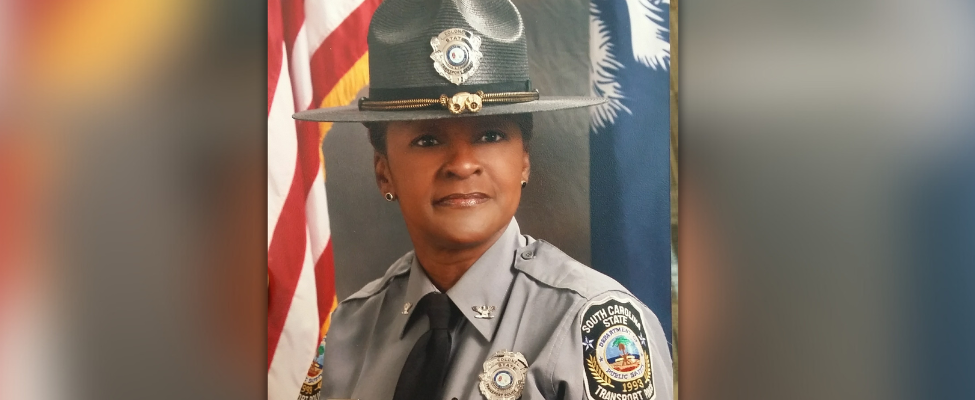
Throughout her life, Colonel Anna Amos tried to set an example — for her two children, for the officers she led as the Colonel of the State Transport Police, but especially for girls and women.
“She wanted to be an example not just for me and my brother, but Black females in general,” D’Ann Amos said of her late mother. “So they can see that they too can achieve some of the things she accomplished.”
There is no shortage of accomplishments or accolades for Amos, who was the first woman to hold several ranks within STP, and the first Black colonel for the law enforcement division that governs the enforcement of state laws and federal regulations pertaining to commercial motor vehicles. To this day, she remains the only woman to hold the rank of commander for any of the SC Department of Public Safety’s three law enforcement divisions.
Amos began her law enforcement career in 1983 conducting inspections on commercial vehicles with the SC Public Service Commission. After the Government Restructuring Act of 1993 created the SC Department of Public Safety and State Transport Police, Amos continued her service there, starting out as a supervisor for STP in the Lowcountry.
As Amos was promoted, she had to commute from Charleston to Columbia every day. D’Ann laments the time she and her brother lost with their mother because of the long commute, but the atmosphere within STP was a comfort.
“It was almost like being a family,” D’Ann said. “We knew everyone, and they always treated us like we were their kids as well.”
Colonel Dean Dill, who became STP’s commander in 2020, and Major Dwayne Wilson both joined STP in 1994. They met Amos the first time while training at the Dorchester County weigh station she supervised. In 1999, she became the first woman to hold the title of Lieutenant Colonel, and a year later, she was appointed to the top role in STP. Wilson noted that Amos was the first commander who did not come from the Highway Patrol to lead the young law enforcement division, which excited many in STP.
“She was soft-spoken and down to earth,” he said. “But when she meant business, she meant business.”
Dill, who received his first promotion under Amos, recalled her gathering the officers to talk with them after she was promoted to Colonel.
“She talked about the mission and things we were going to work on to get better,” he said. “That really set me at ease, knowing that she was fighting for us. She was an exceptional speaker and communicator, and I really had a lot of faith in her after that.”
Well-known at the State House, Wilson said Amos was a fierce advocate for her officers, and worked hard to educate the public about STP’s mission, at a time when the division was still very young.
D’Ann acknowledged that at 5-foot-2, her mother’s small stature didn’t hold her back.
“She commanded the attention of a room whenever she walked in,” she said. “It was really difficult, in a male-dominated field, to be taken seriously in whatever she did. But everyone I’ve encountered since she passed away has talked about that, how she always commanded a room and gained a lot of respect from people.”
Amos perhaps reached the pinnacle of commanding a room when she received a legislative proclamation from the General Assembly with her retirement in 2008. However, she continued promoting traffic safety as director of the Office of Safety Programs at the Federal Motor Carrier Safety Administration in Washington, D.C., until her death from ovarian cancer in 2014. She was 55.
Wilson was a pallbearer at her funeral, and helped carry his former colonel to her final resting place.
“This was my colonel,” he said. “I met her when she was a corporal. I did my first inspections at her weigh stations. I watched her go through the ranks and retire. I helped her move. And then I’m carrying her casket. That stuck with me.”
Her service and story also stuck with Brian Pena, who owns The Karate Dojo in West Columbia. With hundreds of children attending the karate school each week, Pena has created an extensive display of memorabilia from SCDPS troopers and officers over the years, to help his students understand and appreciate law enforcement. Last year, D’Ann gifted Pena a couple of her mother’s badges and awards for the display.
“It’s really important to me that, with her being female and African-American, her legacy continues, and it’s an honor to be able to tell her story to people who come through our doors,” Pena said. “I have two daughters, and it’s important my daughters know that they can grow up to accomplish anything in life.”
For Colonel Amos, her children were her greatest accomplishment, D’Ann said, adding that she and her brother inherited their mother’s work ethic and sense of passion for their work.
“No matter how hard it was, she never stopped,” D’Ann said. “She always wanted us to be able to look back on everything she accomplished. She will always be Mom to us, but to everyone else she will be forever known as Colonel Amos, so that’s one of the things I’m proudest of.”
In addition to working hard, they have other ways in which they honor their mother’s memory. D’Ann’s brother, Daniel, has a 4-year-old daughter named Sophia Anna Amos.
Though Colonel Amos, sadly, never met her granddaughter, D’Ann said they show Sophia pictures, awards and plaques of her grandmother often so she knows about the woman who broke barriers and forged new paths. Proving that even in death, Colonel Amos is still setting an example for future generations.
To engage with this story on the SCDPS Facebook page, please click here: ‘She never... - South Carolina Department of Public Safety | Facebook

![]()
